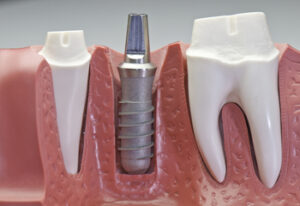Dental health is an integral component of our overall well-being, and the advent of dental implants has significantly impacted the landscape of tooth replacement. Among the key elements of this transformative treatment is the dental implant crown, a critical factor in enhancing aesthetics and ensuring lasting functionality. This extensive guide thoroughly explores the various facets surrounding the dental implant crown cost.
We’ll unravel the complexities, scrutinise the factors influencing pricing, discuss strategies to make this investment more manageable and explain why opting for dental implant crowns is often a superior choice.
The Importance Of Dental Implants
Before we delve into the costs associated with dental implant crowns, it’s essential to understand the significance of dental implants.
Unlike conventional bridges or removable dentures, dental implants provide a long-lasting alternative that resembles real teeth in appearance and feel. They enhance your smile and improve oral health by preventing issues like bone loss and shifting of adjacent teeth.
Factors Influencing Dental Implant Crown Costs

Let’s delve deeper into the key elements shaping the financial landscape of dental implant crown costs:
Type Of Implant Material
The material chosen for the dental implant significantly impacts the overall cost. Titanium implants are a common and cost-effective choice, known for their durability and compatibility with the human body.
On the other hand, ceramic dental implants, crafted for their natural aesthetics and biocompatibility, may incur a higher expense.
The decision between these materials often balances budget considerations and the desire for optimal aesthetics.
Need For Additional Procedures
In some cases, patients may require additional procedures, such as bone grafting, to ensure a solid foundation for the implant. The need for such preparatory treatments adds to the overall cost of the dental implant crown procedure.
The complexity of these procedures depends on individual cases and the condition of the jawbone, highlighting the importance of thorough assessments during the treatment planning phase.
Complexity Of The Case
No two dental implant cases are identical. The complexity of the case, including factors like the number of teeth being replaced, the intricacy of implant placements, and any unique anatomical challenges, can significantly influence the overall cost.
More complex cases may require additional time, expertise, and resources, contributing to a higher investment.
Single-Tooth Implant Vs. Multiple-Tooth Implants
The number of implants needed for the procedure is a fundamental cost determinant. While single-tooth implants are relatively straightforward, cases involving multiple tooth implants, such as full-mouth dental implants, naturally incur a higher expense.
The intricacies of coordinating multiple implants and ensuring their optimal placement contribute to the overall complexity of the procedure.
Geographic Location And Dental Practice
The cost of a dental implant crown process may vary depending on the dentist’s location. Urban centres and high-quality dental clinics may have higher associated costs due to overhead expenses, equipment investments, and the dental professionals’ expertise.
Patients should consider these variations when assessing cost estimates and exploring options within their geographical region.
Understanding these influencing factors empowers individuals to make informed decisions about their dental implant crown procedure, balancing considerations of cost, materials, and overall treatment complexity.
Strategies To Afford Your Dental Implants Cost

In this section, we’ll explore practical approaches to affording your dental implant cost without compromising on quality:
Dental Insurance Considerations
Begin by exploring your dental insurance coverage. While not all insurance plans cover dental implant procedures, some may contribute to the overall cost. Verify the specifics of your plan, paying attention to any limitations or exclusions related to dental implants.
Discuss with your dental insurance provider what coverage is appropriate for you.
Flexible Financing Options
Many dental offices offer flexible financing options to allow patients to pay for their dental implant crown over time. Enquire about in-house financing plans or partnerships with external financing companies.
These options can provide a more manageable payment structure, allowing you to undergo the procedure without a substantial upfront financial burden.
Healthcare Savings Accounts (HSAs) And Flexible Spending Accounts (FSAs)
Investigate the possibility of utilising healthcare savings accounts (HSAs) or flexible spending accounts (FSAs) to cover eligible medical expenses, including dental implant procedures.
With the help of these tax-advantaged accounts, you may manage the cost of your dental implant crown by setting aside pre-tax income for approved medical expenditures.
Discuss Payment Plans With Your Dental Professional
Open communication with your dental professional is crucial. Discuss your financial concerns and enquire about potential payment plans or phased payment options.
Some dental practices may tailor payment schedules to accommodate individual budgets, ensuring that the financial aspect of the treatment aligns with your needs.
Explore Charitable Organisations And Grants
Investigate charitable organisations and grants that support individuals in need of major dental treatments. Some nonprofits and foundations focus on providing financial assistance for dental procedures, including dental implants.
Applying and looking into these options might be a great help for people who are struggling financially.
Managing the expense of dental implants requires initiative and the readiness to consider other choices. By combining insurance coverage, financing options, and other measures, people can ensure that they have access to high-quality dental implant crowns while staying within their budget.
Exploring Different Types Of Implants And Their Association With Dental Implant Crowns
Several types of dental implants exist, each intended to meet certain requirements and considerations. Understanding the distinctions between these implants is crucial, as they directly influence the choice of dental implant crown and the overall success of the treatment.
Endosteal Implants
The most common type is endosteal implants, which are directly placed into the jawbone through a surgical procedure. These implants are a sturdy foundation for dental implant crowns, offering excellent stability and mimicking the natural tooth root structure.
Subperiosteal Implants
Unlike endosteal implants, subperiosteal implants rest on the jawbone beneath the gum tissue. This type is suitable for individuals with insufficient bone height, as it eliminates the need for bone grafting. Subperiosteal implants are often used when traditional implant placement is challenging.
Transosteal Implants
Transosteal implants, or mandibular staple implants, involve a more invasive procedure where the implant passes through the jawbone, securing itself above the gum line. While less common than other types, transosteal implants are employed in specific cases where traditional methods are impractical.
Mini Implants
Mini implants are smaller than standard implants, making them suitable for individuals with limited jawbone density. Although primarily used to stabilise dentures, mini implants can support dental implant crowns in certain situations.
Zygomatic Implants
Zygomatic implants are secured in the zygomatic bone, or cheekbone, unlike jawbone implants. This kind offers a workable way to support dental implant crowns without requiring substantial bone grafting. Still, it is only appropriate for situations with significant bone loss in the upper jaw. Each type of implant is carefully selected based on factors such as jawbone condition, patient anatomy, and treatment goals. Once the appropriate implant is placed, the connection with the dental implant crown is established through an abutment, a connector that links the implant to the visible crown.
What To Expect When You Start Your Treatment To Replace Missing Teeth With Dental Implants

In this section, we’ll guide you through the key stages of dental implant treatment, providing insights into the expectations and considerations at each step:
Initial Consultation And Assessment
A thorough first consultation with dentists experienced in dental implants marks the start of the process. In addition to examining your medical history and taking imaging tests to determine bone density and structure, your dentist will also examine your oral health. This important first step creates the framework for creating a customised treatment plan that meets your needs.
Treatment Planning And Customisation
Following the assessment, your dental professional will collaborate to create a detailed treatment plan.
This plan outlines the number of implants required, the type of implant material, any additional procedures, such as bone grafting, and the expected timeline.
This collaborative process ensures that the treatment aligns with your goals and expectations.
Implant Placement Surgery
Implant placement surgery is a pivotal phase of treatment. It is typically performed under local anaesthesia, ensuring a comfortable experience. During this process, a tiny titanium post—the dental implant—is surgically placed into the mandible.
The healing phase after surgery is essential for the implant to osseointegrate, i.e., integrate with the surrounding bone.
Healing And Osseointegration
During this period, the implant can merge with the jawbone, creating a strong base to which the dental implant crown will eventually be attached. Good osseointegration is crucial for the long-term viability of the dental implant; hence, patience is crucial during this stage.
Abutment Placement
When osseointegration is finished, the implant is connected to an abutment. The dental implant crown and the implant are connected via the abutment. This step is relatively minor and is often performed as an outpatient procedure.
Impressions And Customisation
Impressions of your teeth are taken to create a custom dental implant crown that matches your natural teeth’s colour, shape, and size. This personalised approach ensures seamless integration with your smile, enhancing aesthetics and functionality.
Final Crown Placement
The final stage involves placing the dental implant crown on the abutment. This crown is securely attached, completing the restoration process. Your dental professional will ensure that the crown fits comfortably, functions properly, and complements your overall oral aesthetics.
Post-Treatment Care And Follow-Up
After the dental implant crown is placed, regular follow-up appointments are scheduled to monitor your oral health and implant performance. Maintaining excellent oral hygiene and attending these check-ups is crucial for the long-term success of your dental implant.
Dental Implant Crowns Vs. Dental Implant Bridges

In this section, we explore the unique advantages that dental implant crowns offer over their bridge counterparts, emphasising why they stand out as a superior choice for comprehensive oral health:
Individual Tooth Restoration
Dental implant crowns are designed to replace individual missing teeth. Unlike dental implant bridges, which anchor multiple crowns together, each dental implant crown is affixed to its implant, mimicking the natural structure of a tooth.
This individualised approach ensures seamless integration with existing teeth and allows for targeted restoration.
Preservation Of Adjacent Teeth
One of the distinctive benefits of dental implant crowns is their ability to preserve adjacent natural teeth. To support the bridge construction, dental implant bridges frequently require the nearby healthy teeth to be altered.
Dental implant crowns, on the other hand, attach directly to the implant, negating the need to modify the neighbouring teeth. Maintaining the natural shape of teeth is beneficial for maintaining dental health over time.
Enhanced Aesthetics And Comfort
Dental implant crowns excel at providing a natural and aesthetically pleasing appearance. Crafted to match surrounding teeth’s colour, shape, and size, implant crowns seamlessly integrate into the smile.
Additionally, the individual nature of dental implant crowns enhances comfort, avoiding potential discomfort or irritation caused by the interconnected structure of implant bridges.
Improved Longevity And Durability
Dental implant crowns boast exceptional longevity and durability. Securing each crown to its implant enhances the restoration’s overall stability and strength.
This design minimises the risk of stress on neighbouring teeth, ensuring that the implant crown functions optimally for an extended period. Patients can expect a reliable and long-lasting solution for their missing teeth.
Easy Maintenance And Oral Hygiene
Maintaining oral hygiene is simplified with dental implant crowns. Each implant crown’s nature allows easy access during brushing and flossing, promoting effective oral care.
In contrast, dental implant bridges may present challenges in reaching the areas beneath the bridge, potentially compromising oral hygiene and increasing the risk of decay or gum issues.
Versatility In Replacement Options
Dental implant crowns provide versatility in replacing missing teeth, accommodating various scenarios from single-tooth implants to full-mouth dental implants.
This adaptability allows for a tailored treatment approach based on individual needs, ensuring patients receive the most effective and personalised solution.
Choosing dental implant crowns over bridges is a strategic decision that prioritises the preservation of natural teeth, aesthetic excellence, and long-term oral health.
Frequently Asked Questions
 What is the typical lifespan of a dental implant crown?
What is the typical lifespan of a dental implant crown?
When properly cared for, dental implant crowns can last many years and even a lifetime. Longevity depends on oral hygiene practices, overall health, and regular dental check-ups.
Is the dental implant procedure painful?
Although individuals’ level of discomfort varies, local anaesthetic is usually used throughout the dental implant operation to ensure minimal pain. Prescribed medications can manage post-operative discomfort.
Can dental implant crowns be done in a single appointment?
The dental implant process usually involves multiple appointments. Initial consultations, treatment planning, implant placement, and crown attachment are distinct stages, allowing for precision and optimal results.
Does insurance cover dental implant crowns?
Coverage varies among dental insurance plans. While some plans may cover a portion of the costs, others may have limitations or exclusions. It’s important to contact your insurance company to determine your exact coverage.
How long does it take to recover from dental implant surgery?
Recovery times can vary, but patients generally experience a few days of mild discomfort. Full recovery may take several weeks to months, during which the implant integrates with the jawbone.
Can dental implants be used to replace multiple missing teeth?
Yes, dental implants can be utilised to replace single or multiple missing teeth. The treatment plan will be customised based on individual needs and considerations.
What are the primary benefits of choosing dental implant crowns over other options?
Dental implant crowns offer superior aesthetics, functionality, and longevity compared to traditional options like dental bridges. They promote overall oral health by mimicking natural teeth and preventing bone loss.
Are there any issues associated with dental implant procedures?
While dental implant procedures are generally safe, like any surgical or invasive procedure, there are associated risks. These can include infection, nerve damage, or implant failure. Consulting with a qualified dental professional helps mitigate these risks.
Can dental implants be performed if I have gum disease?
A thorough assessment is necessary to determine if dental implants suit individuals with gum disease. In some cases, gum disease treatment may be required before implant placement.
How do I care for my dental implant crown post-treatment?
Keeping your mouth clean is essential. Your dental implant crown will last long if you brush, floss, and have regular dental check-ups.
Affording Your Crown And Dental Implant Costs
Obtaining a dental implant crown is a significant step towards reclaiming a confident smile and optimal oral health.
The journey towards a dental implant crown is a personalised and transformative experience. With a thorough understanding of the cost dynamics, affordability strategies, procedural expectations, and advantages of implant-supported crowns, individuals can approach this endeavour with confidence and informed decision-making.
Contact Digital Dental Surgery Sydney, Sydney NSW 2000, at (02) 8294 5812 to get your missing tooth replaced.
Note: Any surgical or invasive procedure carries risks. Before proceeding, you should seek a second opinion from an appropriately qualified health practitioner.
Sources
5 Reasons Why Dental Implants Are so Popular | College of Dentistry | University of Illinois Chicago. dentistry.uic.edu/news-stories/5-reasons-why-dental-implants-are-so-popular.
Bhatiya, Rehan. “Understanding the Factors Influencing Dental Implants Cost.” Medium, 25 Aug. 2023, medium.com/@rehanbhatiya/understanding-the-factors-influencing-dental-implants-cost-79de6517a8da.
Can I Use My HSA or FSA to Pay for Dental Services? blog.healthequity.com/hsa-and-fsa-for-dental-care.
Dental Implant Surgery – Mayo Clinic. 29 Jan. 2019, www.mayoclinic.org/tests-procedures/dental-implant-surgery/about/pac-20384622.
Robinson, Kara Mayer. “Types of Dental Implants.” WebMD, 2 May 2022, www.webmd.com/oral-health/types-dental-implants.
Stanek, Becca. “Dental Implant Vs. Bridge: Pros, Cons and How to Choose.” Forbes Health, 19 Dec. 2023, www.forbes.com/health/dental/implant-vs-bridge.
Steinheimer, Lauren. “5 Ways to Get Low-Cost Dental Implants.” NewMouth, 9 Feb. 2024, www.newmouth.com/blog/low-cost-dental-implants.
Zirconia or Titanium Dental Implants | Materials, Properties and Strengths of Tooth Implants. www.click4teeth.com/feature-articles/what-materials-dental-implants.


 What is the typical lifespan of a dental implant crown?
What is the typical lifespan of a dental implant crown?



